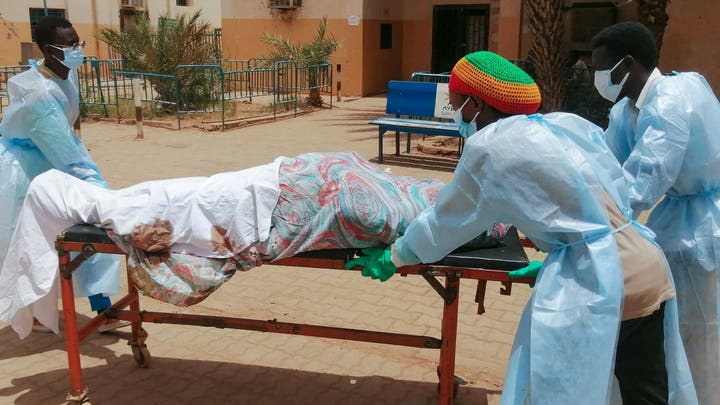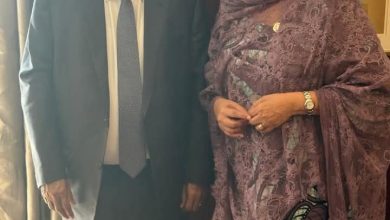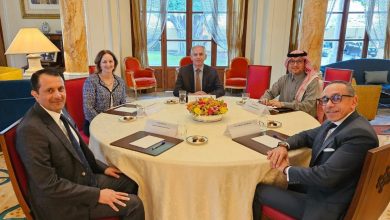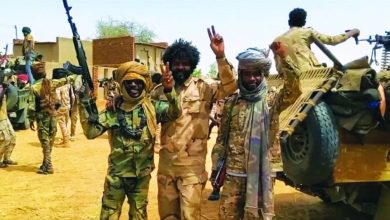
Volunteers from the Sudanese Red Crescent are exhuming makeshift graves in the Al-Azhari neighborhood in southern Khartoum, dug by families to bury relatives who died during the war when fighting and aerial bombardment made it impossible to lay them to rest in official cemeteries.
After hastily burying them in yards, schools, and public squares, many families have finally been able to hold proper farewell ceremonies for about 2,000 loved ones who lost their lives during the ongoing war since April 2023.
Dignified Farewell Ceremonies
Families and Red Crescent volunteers have taken advantage of the relative calm that Khartoum has enjoyed since the army managed in June to drive out the Rapid Support Forces (RSF), to exhume the remains from informal graves and relocate them.
In Al-Azhari, volunteers wearing white suits, red gloves, and protective masks use shovels to remove layers of soil from remains that were buried hastily. They carefully lift the bodies, place them in bags labeled with identification tags, and load them into small trucks to be transported to the Andalus Cemetery, about 10 km away.
For unidentified bodies, volunteers attach special labels and keep detailed records.
Makeshift Graves
Hisham Zain Al-Abidin, head of the forensic sector in Khartoum, told Agence France-Presse that his team found 307 makeshift graves in Al-Azhari “located in front of houses, in mosques, and in schools,” noting that their relatives had been unable to bury them properly or hold funerals during intense fighting between the warring sides.
Shortly after the outbreak of war in April 2023, the RSF took control of major cities, including Khartoum.
“We Couldn’t Find a Place to Bury Her”
In an open dusty space dotted with patches of green grass, Jawahir Adam watches Red Crescent volunteers, accompanied by two excavators, as they dig up the grave of her daughter, who was killed in the fighting.
“She was 12 years old,” Adam says, tears streaming down her face. She explains that her daughter was outside the home to buy new shoes when she was killed by shelling of unknown origin. “We couldn’t find a place to bury her, so we buried her in the neighborhood.”
Adam says she is experiencing the pain of burying her daughter for the second time, “but this time with dignity,” adding, “It’s painful, but honoring the dead means burying them.”
War Casualties
The war between the army, led by Abdel Fattah al-Burhan, and the RSF, led by Mohamed Hamdan Dagalo, has killed tens of thousands of Sudanese.
Former U.S. envoy Tom Perriello has stated that at least 150,000 people were killed in the first year of fighting, though obtaining an exact death toll is nearly impossible.
Many of the dead fell in bloody battles in densely populated neighborhoods, in the absence of healthcare facilities to treat the wounded or conduct proper counts of the dead.
According to the London School of Hygiene & Tropical Medicine, deaths in Khartoum increased by 50% during the first 14 months of war, with 61,000 deaths recorded, including 26,000 caused directly by violence.
In the Al-Azhari cemetery, when Sudanese buried their relatives, they marked each grave with a piece of wood, a temporary headstone, or stones engraved with names.
The Red Crescent has so far recovered about 2,000 bodies in Khartoum, estimating that informal cemeteries in the capital contain at least 10,000 remains.
Waiting for the Missing
As many mothers tearfully watch their loved ones’ remains being moved from the Al-Azhari cemetery, thousands of others still do not know the fate of their children.
Last year, the International Committee of the Red Cross recorded 8,000 missing persons in Sudan, stressing that this is “only the tip of the iceberg” of the total number of missing.
Before the war, Khartoum’s population was about nine million; at least 3.5 million have been displaced by the fighting, according to UN figures, which project that two million people could return to the capital before the end of this year.
That, however, depends on the stability of the security situation and the restoration of infrastructure, as most areas of the capital remain without electricity or clean water, while schools and hospitals lie in ruins.
Building Schools
After the bodies are removed from Al-Azhari, local officials will be able to proceed with a project to build a school on the site, according to Youssef Mohamed Al-Amin, executive director of Jebel Aulia locality in southern Khartoum.
“God willing, the people of the neighborhood will build schools there to educate their children. The remains in the field were preventing the school’s construction,” Al-Amin explained.




